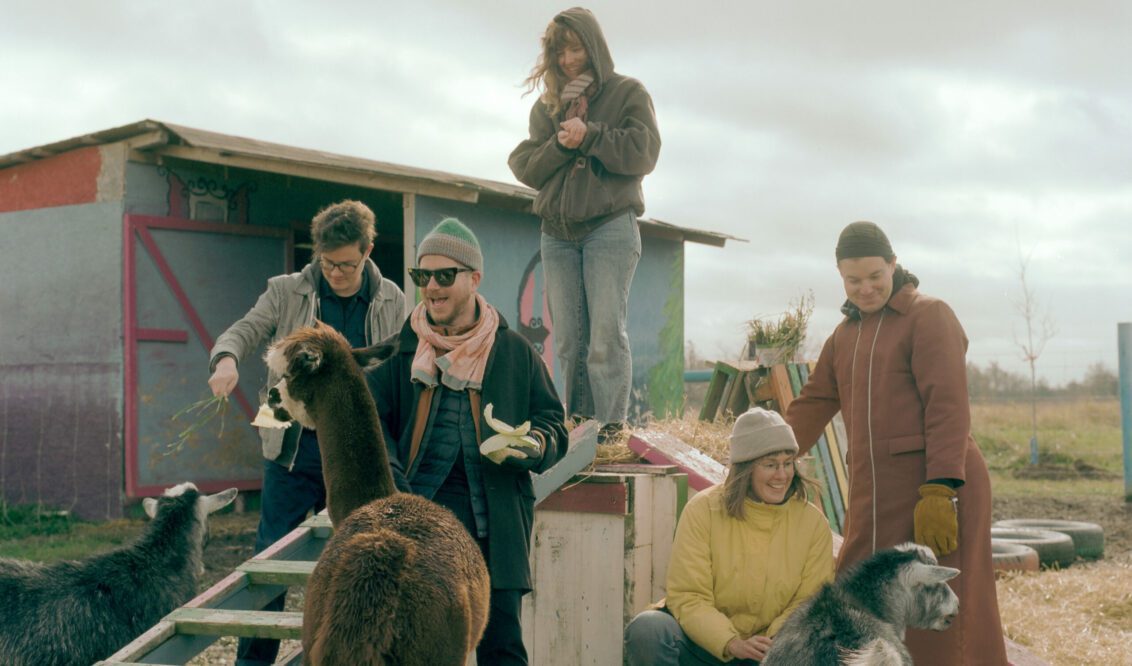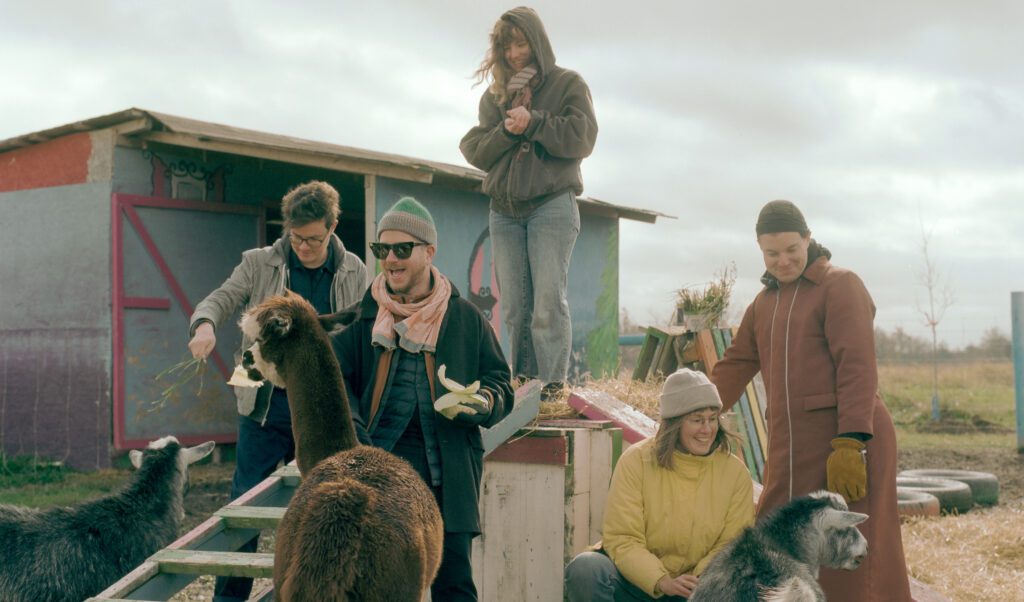

On a small island just outside of Toronto in the summer of 2019, Robin Dann and her band, Bernice, unknowingly made a record that would be extremely relevant to the unforeseeable year ahead. On Eau De Bonjourno, Bernice covers themes of isolation, disconnecting self-worth from productivity and escaping into the imagination. Dann and her bandmates Thom Gill, Dan Fortin, Phil Melanson and Felicity Williams combine their deep knowledge of jazz and shared curiosity for experimentation to create an album that truly transports the listener.
Dann says that this is the first time the band attempted songwriting as a group, a new challenge that proved to be worth the clunky learning curve. “Collaborative songwriting… I think it’s never easy until you land on a flow,” explains Dann, the band’s lead vocalist and (previously) primary songwriter. “Thankfully, Thom and I have been playing together for so long, we have almost like a psychic connection that works really well… I think the songs on this record are some of our best that we’ve ever written.” The band wrote all of the songs for Eau De Bonjourno in an old school container on Toronto Island. The way that Dann explains the residency – creating and relaxing with friends on a sunny island – sounds like a literal fairytale compared to the way most of us have been living our lives for the past year, more or less in complete isolation.
Shortly after Bernice finished recording the album in late 2019, everything changed, including the meaning of some of their new songs. Take, for instance, “Bubble,” a song that Dann initially wrote about being uncomfortable in crowds; in 2020, crowds meant contracting more than just social anxiety. The song’s lyrics – “You’re not allowed in my personal bubble/Please step away from my personal bubble” – sound like they could be 2020’s catchphrase. “When we wrote that song… it was a lot more related to having mixed feelings about being social and being in crowded spaces and having a lot of friends that have anxiety around that,” says Dann. “Now, that’s not what it’s gonna be about. It’s gonna be about this year’s experience for anyone who listens to it now. I love that – I love how a song can just change identities when it needs to.”
Most of Dann’s lyric writing contains an innate universality, allowing the song to mold its meaning to the psyche of whoever’s listening. This elasticity is mimicked in the band’s instrumentation — a lush orchestra of experimental synths following syncopated rhythms. And while Dann’s crystal voice and intuitive melodies contain traces of R&B and pop, the band’s heavy jazz influence is evident in the improvisational nature of the music. This “play it as it comes” disposition is something Dann comes back to again and again in the record. Mindfulness and self-acceptance play a central role in this record – and in her everyday life.
On “It’s Me, Robin,” Dann presents the idea that just being is enough. And in a time when so many of our lives have been put on pause, this idea is more than welcome. The song starts out with an unapologetic introduction: “It’s me Robin/You don’t really know me/I thought if I just expressed this/You might just let me be me and accept that/I’m here, still here/I am really here.” In this song, Dann is simply and elegantly stating that a person is not a list of their accomplishments, social connections or financial assets, that being yourself and being at peace with who that person is is as good a vocation as any. “I don’t agree with [the idea of] some lives having more or less value than other lives,” explains Dann. “It’s like, am I gonna accept myself just for who I am no matter what I do? Or am I gonna continuously try to better myself and do more for my community? And can you live with both somehow? I feel like I’m confronting that a lot.”
These existential questions are ones that seem to have been screamed into the ether for millions of years, and although Dann is still searching for the answers herself, she gives such succinct advice on that it feels she’s on the right track: “Give yourself the same love you receive, believe in your inner value,” she concludes.
Dann’s constant reminders to find worth from within and immerse yourself in the moment are therapeutic in nature, but even more so when sung in her translucent, soothing falsetto. Especially on “Lone Swan,” which was inspired by a swan who would follow her around Toronto Island. Dann explains that swans are creatures of wonder to her – that one day, when swans are extinct, humans will look back in disbelief that we shared the planet with them. “Swans are interesting to me because they have this horrible reputation, but you see them and you’re like, ‘You are not of this world,’” says Dann. “Like, how do people see swans and just accept that they’re real? I see a swan and I’m like, that’s an alien, like that is coming from another planet, it’s not a bird.”
Simple, but awe-inspiring moments like this throughout Eau De Bonjourno remind the listener not to take our surroundings for granted, but not to take them too seriously either. This balance of playfulness, self-awareness and intention is what makes Bernice’s music so pleasant to listen to, and even heal to. Maybe, one day, we’ll be able to look back on pandemic times the way Dann predicts our predecessors will look at swans – in shock and awe that they ever existed. Until then, I suggest taking a page from Dann’s book on living: “If I did nothing but love myself and love one other person, that’s fine.”
Follow Bernice on Facebook and Instagram for ongoing updates.

